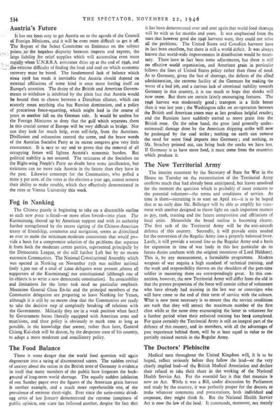Austria's Future
• It has not been easy to get Austria on to the agenda of the Council of Foreign Ministers, and it will be even more difficult to get it off. The Report of the Select Committee on Estimates on the subject - o p ints,..161 'the hopeless disparity between imports and exports, the large liability Or relief supplies which will accumulate even more rapidIv.When'U.N.R.R.A. assistance dries up at the end of 1946, and
t e--extreme difficulty of finding the food and coal on which economic recovery must be based. The fundamental lack of balance which since 1918 has made it inevitable that Austria should depend on external affiliations of some kind is once more forcing itself on Europe's attention. The desire of the British and American Govern- ments to withdraw is inhibited by the plain fact that Austria would be bound then to choose between a Danubian alliance, which can scarcely mean anything else but Russian domination, and a policy of precarious fence-squatting, which might lead in the course of years to another fall on the German side. It would be useless for the Foreign Ministers to deny that the gulf which separates them in this crucial corner of Europe will be very difficult to bridge. Nor can they look for much help, even self-help, from the Austrians. Disillusion and exhaustion control the scene, and the brave words of the Austrian Socialist Party at its recent congress give very little reassurance. It is easy to say and to prove that the removal of all occupying forces will lighten Austria's economic burden. But political stability is not assured. The strictures of the Socialists on the Right-wing People's Party no doubt have some justification, but strictures can no more rule Austria in the future than they have in the past. Likewise contempt for the Communists, who polled a mere 5 per cent. of the votes at the election a year ago, cannot remove their ability to make trouble, which they effectively demonstrated in the riots at Vienna University this week.


































 Previous page
Previous page